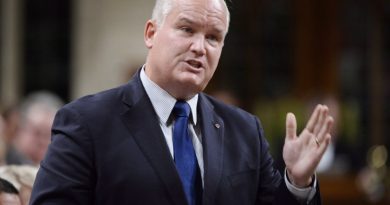How a Liberal minority government could help, or hit, Canadians’ wallets
TORONTO — From more money for little ones to cheaper cellphone bills and a tax on luxury vehicles, a Liberal minority government and its potential parliamentary partners could help, or hit, your wallet, depending on your income level. Canadians on Tuesday woke up to the same prime minister but a minority Liberal government that will need the support of either the NDP or the separatist Bloc Quebecois to fulfil its campaign promises.
Here’s a look at what Justin Trudeau’s government and its potential parliamentary partners may have in store for Canadian consumers.
Child care:
Parents of young children may have more money to spend on diapers and other essentials or less costly care options for their little ones.
The Liberals promised to increase the Canada Child benefit by up to $1,000 more for kids under the age of one. Trudeau has also promised to create up to 250,000 more before-and-after child care spaces for kids under 10, and lower the cost of these programs by 10 per cent across the board. The cost of before-and-after child care varies depending on location, but a recent Statistics Canada report said that 48 per cent of parents paid under $200 a month while 52 per cent paid $200 or more on a monthly basis. At $200 a month, the Liberals’ 10 per cent reduction would amount to $240 in savings per year.
The NDP, meanwhile, has pledged to invest $10 billion over the next four years to create 500,000 new child-care spaces in Canada, with prices capped at $10 per day.
Education:
Students, or those supporting their dependents as they pursue post-secondary education, may also find a few extra dollars to work with.
The Liberals have pledged to give full- and part-time students up to $1,200 more per year through increased Canada Student Grants. As well, students would have two years, interest-free, before they have to start repaying their loans. The Liberals also said they would change the rules so that graduates won’t have to repay student loans until they make at least $35,000 and if their income slips below that threshold, their payments would be paused.
The NDP’s plan is to work with provinces and territories to cap and reduce tuition fees over the long term, with the goal of making post-secondary education free and part of the public education system.
Housing:
Canadians looking to get into the real estate market may get a leg up as well.
The Liberals have pledged to move ahead with the new First-Time Home Buyer Incentive, which would provide home-buyer subsidies of 10 per cent on their first home and an increase in the value of homes that would be eligible. They said they would increase the qualifying value to nearly $800,000 in Canadian cities where the average house costs more, such as Toronto and Vancouver. The average sale price of a home in Canada was $629,200, according to October figures from the Canadian Real Estate Association. But in Greater Toronto and Greater Vancouver, the average price was $806,700 and $986,500, respectively.
The NDP’s plan is to re-introduce 30-year terms for mortgages insured by the Canada Mortgage and Housing Corporation, in which home-buyers have put down less than 20 per cent down payment. In their platform, the NDP said this longer term would result in smaller monthly payments. It also pledged to double the Home Buyer’s Tax Credit to $1,500.
Technology:
The high cost of mobile phone service in Canada — which is among the most expensive in the world — may potentially come down as well, based on the parties’ promises.
The Liberals have said they plan to help cut the cost of cell and wireless services by 25 per cent over the next two years by “using the government’s regulatory powers” over Canadian telecom companies. They say this would save the average middle-class family of four nearly $1,000 per year.
The NDP have proposed a price cap on cell phone and internet bills, and also require that companies would offer unlimited wireless data options at “affordable rates” to avoid surprise bills.
Wages and employment insurance:
Both the Liberals and the NDP have proposed a federal minimum wage of $15 per hour. The Liberals have also said they will extend employment insurance sickness benefits — which pay temporary disability benefits to eligible workers up to a maximum of $562 a week as of Jan. 1, 2019 — from 15 weeks to 26 weeks. The NDP have proposed to extend it even further to 50 weeks of coverage.
Taxes:
The Liberals have said they would raise the basic personal tax amount — the amount for which Canadians do not pay income tax — by almost $2,000 by 2023 for people earning under $147,000 a year, which Trudeau says would save the average Canadian $292 per year. Currently, Canadians don’t pay income tax on the first $12,309 earned which, under the Liberals’ plan, would increase to $13,229 and $15,000 by 2023.
Those buying a new car, boat or plane, meanwhile, may have to pay as much as $10,000 more. Trudeau has pledged to introduce a new 10 per cent tax on luxury cars, boats and personal aircraft over $100,000.
The NDP have promised to raise the top marginal tax rate on income over $210,000 by two percentage points to 35 per cent. It also vowed to put in place a one-per-cent annual wealth tax for Canadians worth more than $20-million, and increase the capital gains inclusion rate — the rate at which capital gains are taxed — to 75 per cent.
Seniors:
Canadians in their golden years, or family members supporting them, may also save a few more dollars.
Trudeau has said his government would increase Old Age Security by an extra 10 per cent once seniors reach age 75, which the Liberals have said amounts to as much as $729 each year. The Liberals have also said they plan boost the Canada Pension Plan survivor’s benefit by 25 per cent, which they pegged as worth up to $2,080 in additional benefits each year. The NDP has pledged to make the Canada Caregiver Tax Credit refundable, a move which it says will “provide thousands of dollars to the most low-income caregivers.”
News from © The Canadian Press, 20XX. All rights reserved. This material may not be published, broadcast, rewritten or redistributed




